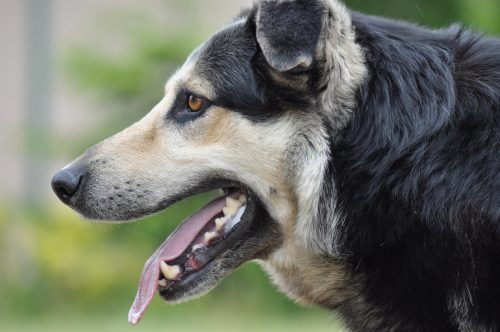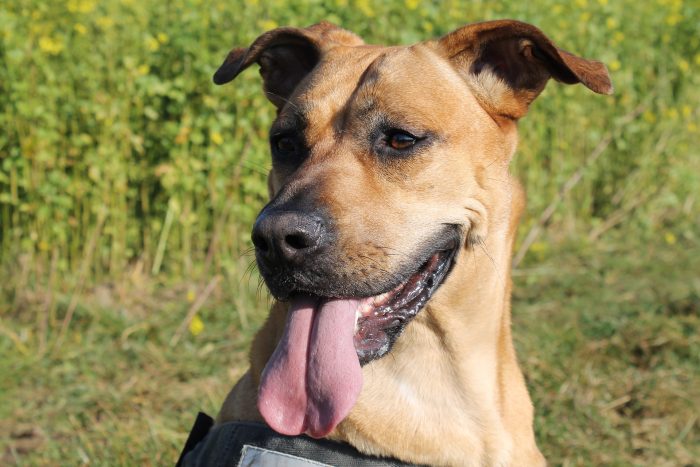Like their human owners, dogs can develop asthma —a condition involving wheezing, shortness of breath, and difficulty breathing. Called allergic bronchitis in canines, dogs develop this condition mostly as an allergic reaction to their environment.
Asthma attacks cause a dog’s upper airways to spasm and constrict, leading to near suffocation. If this acute condition becomes chronic, the tissue in the respiratory passageways could become permanently damaged.
The good news? There are a number of treatments available to manage allergic bronchitis in dogs.
Symptoms of Asthma in Dogs
Dogs, like humans, can develop asthma — but the symptoms and route for treatment are much different. Canine allergic bronchitis tends to affect young and middle-aged dogs, though older dogs can be affected as well.
The telltale sign of asthma in dogs is a persistent, dry, hacking cough which can appear either slowly or suddenly. Symptoms vary from the occasional breathing problem, called dyspnea, to severe dyspnea reaching suffocation. At this point, the allergic bronchitis is often considered chronic and irreversible.
In the worst-case scenario, a dog may be forced to breathe from his mouth; his gums blue from lack of oxygen. If the condition becomes this severe, he will need immediate attention to survive.
Therefore, catching these symptoms early on is key. Common symptoms of asthma in dogs include:
- Difficulty breathing
- Shortness of breath
- Wheezing
- Dyspnea
- Open-mouth breathing
- Dry, hacking cough
- “Blue” gums or pale mucous membranes
- Extreme fatigue
- Lack of interest in exercise
- Lack of appetite
- Weight loss
If your dog exhibits difficulty breathing and a dry, raspy cough, take him to the vet for treatment right away.
Dogs at Risk for Asthma
Chronic allergic bronchitis is most common in small dog breeds, although large breed dogs are susceptible, too. Dogs surrounded by the following allergens are also at risk:
- Tobacco, fireplace, or wood stove smoke
- Perfume
- Air fresheners
- Household cleaners
- Pesticides or fertilizer
- Air pollution
- Pollen
- Mold spores
- Particles from cat litter
How to Prevent Asthma in Dogs
Allergic bronchitis is a tricky condition that may not be fully recognized until it’s too late to reverse. Therefore, taking proper care to prevent it in the first place will give your dog the best chance at living asthma-free.
- Bathe your dog regularly and thoroughly dry him after each bath.
- Don’t smoke near your pets.
- Forego your fireplace or wood-burning stove for battery-powered candles or fake glowing logs.
- Opt for non-toxic plants and use natural pesticides in places your dog can’t reach.
- Use natural cleaners around your house, such as white vinegar straight from the bottle or diluted with water.
- Wear natural scents, such as essential oils that can be mixed to duplicate common scents without the allergens.
- Install air purifiers to reduce the air pollution in your home. A less expensive option would be to install a HEPA (high-efficiency particulate air) filter in your air conditioning system in order to reduce the humidity in your home, which can aggravate asthma.
- If you have cats at home, use dust-free cat litter, which is good for your entire household including your cat’s lungs.
- Consider getting rid of your carpet, which often carries toxic chemicals from the manufacturing process.
Treating Asthma in Dogs
Although canine allergic bronchitis is uncommon, there are a number of treatment options available to help care for your dog. Identifying and removing the allergen from your dog’s environment is the number one goal of treatment, as asthma usually develops from something the dog has inhaled.
Your veterinarian will want to know about any environmental changes in the household, such as the use of new household cleaners; room fresheners; fertilizers; cigarette or fireplace smoke, and more.
In some cases, the allergen is not identified at all. In this case, a number of medications are available for symptomatic management. If the asthma becomes chronic, however, the cough will never fully dissipate, and therapy will be used to help reduce the cough and make your dog more comfortable.
Dogs with asthma may undergo rigorous treatment in order to minimize long-term damage on the airways. The most common type of treatment involves glucocorticoids and bronchodilators, which help reduce the severity of attacks. These can be administered through inhalers, which are increasingly common today and designed to fit the dog’s mouth. In the case of a secondary infection, antibiotics may be used, as well as cough suppressants.
Asthma in dogs is not common, but the good news is that several treatments are becoming increasingly available to ensure your dog lives the carefree, happy life he was meant for.






